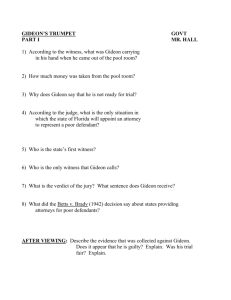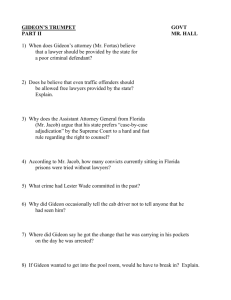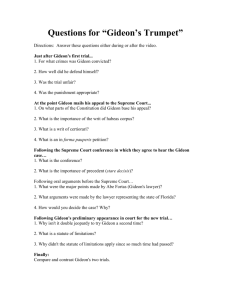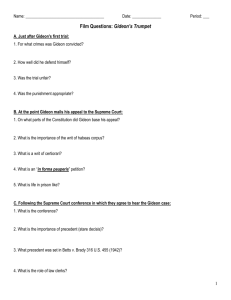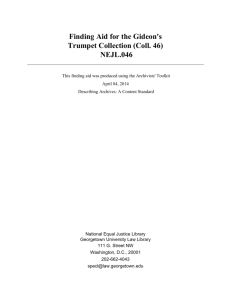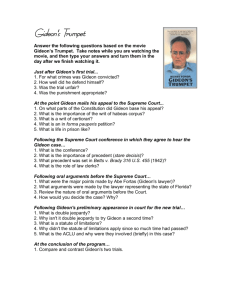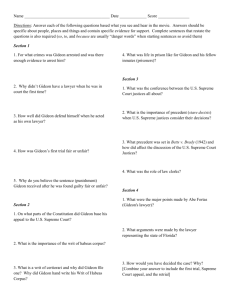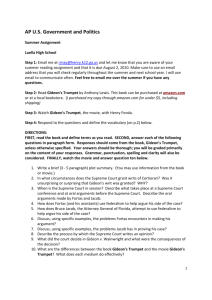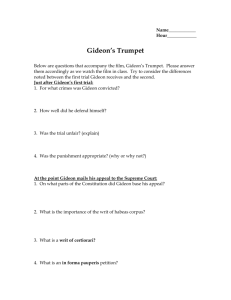CJUS 250 CRN 20412
advertisement
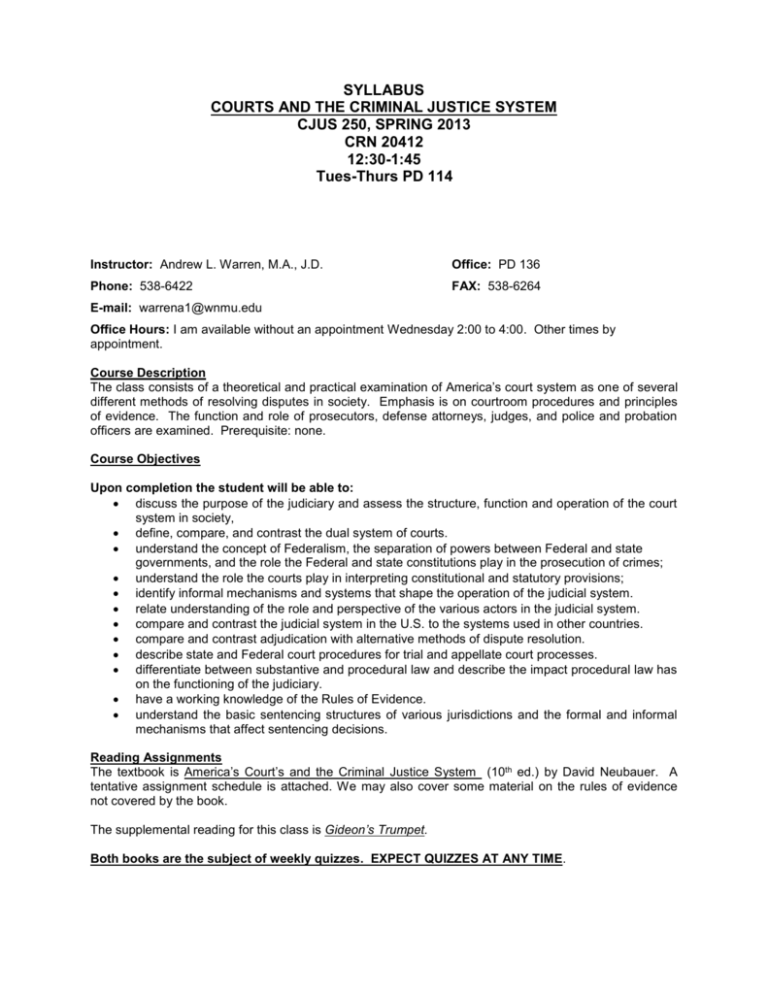
SYLLABUS COURTS AND THE CRIMINAL JUSTICE SYSTEM CJUS 250, SPRING 2013 CRN 20412 12:30-1:45 Tues-Thurs PD 114 Instructor: Andrew L. Warren, M.A., J.D. Office: PD 136 Phone: 538-6422 FAX: 538-6264 E-mail: warrena1@wnmu.edu Office Hours: I am available without an appointment Wednesday 2:00 to 4:00. Other times by appointment. Course Description The class consists of a theoretical and practical examination of America’s court system as one of several different methods of resolving disputes in society. Emphasis is on courtroom procedures and principles of evidence. The function and role of prosecutors, defense attorneys, judges, and police and probation officers are examined. Prerequisite: none. Course Objectives Upon completion the student will be able to: discuss the purpose of the judiciary and assess the structure, function and operation of the court system in society, define, compare, and contrast the dual system of courts. understand the concept of Federalism, the separation of powers between Federal and state governments, and the role the Federal and state constitutions play in the prosecution of crimes; understand the role the courts play in interpreting constitutional and statutory provisions; identify informal mechanisms and systems that shape the operation of the judicial system. relate understanding of the role and perspective of the various actors in the judicial system. compare and contrast the judicial system in the U.S. to the systems used in other countries. compare and contrast adjudication with alternative methods of dispute resolution. describe state and Federal court procedures for trial and appellate court processes. differentiate between substantive and procedural law and describe the impact procedural law has on the functioning of the judiciary. have a working knowledge of the Rules of Evidence. understand the basic sentencing structures of various jurisdictions and the formal and informal mechanisms that affect sentencing decisions. Reading Assignments The textbook is America’s Court’s and the Criminal Justice System (10th ed.) by David Neubauer. A tentative assignment schedule is attached. We may also cover some material on the rules of evidence not covered by the book. The supplemental reading for this class is Gideon’s Trumpet. Both books are the subject of weekly quizzes. EXPECT QUIZZES AT ANY TIME. Grading There are three exams in this class; two during the term and a final. You should expect quizzes every Thursday over both Gideon’s Trumpet and the assigned reading from Neubauer. Final grades are assigned as follows: (90 – 100%) (80 – 89%) (70 – 79%) (60 – 69%) (60%) A B C D F Grades may be curved in the discretion of the instructor. I believe the five-paragraph essay is the basis of all good writing. There are three five- paragraph essays assigned in this class. The first is a draft of a five-paragraph essay over the movie Anatomy of a Murder. It will be returned and you are required to make the corrections indicted. A second five-paragraph essay is assigned over the movie12 Angry Men. When the instructions tell you “Do not deviate from this model by so much as a single sentence, I mean it. Good writing requires discipline. Once you master, and I mean master the discipline, then you are free to break the rules. Test Schedule Quizzes over both Neubauer and Gideon’s Trumpet should be expected AT ANY TIME. Quizzes are worth 10 pts. each. Exams are tentatively scheduled for February 14, April 9, and May 10. Make-up quizzes and exams will be given only in cases of extreme emergency or university excused absences. If possible, I must be notified in advance of the need to take a make-up. I am the judge of when this is possible and you should expect to be required to produce documentary evidence to support the unavoidability of the absence. The Final Exam is Thursday May 12 at 10:00 AM Attendance Attendance is taken in this class. Most of the material in this class is from the books, but lecture will enable you to understand it. Any student whose grade is lower than a “C” and misses two consecutive quizzes or tests may be dropped from the class. There is no guarantee that I will do so, but be advised that it can happen. If you choose to drop the class that is your responsibility and you should NOT assume that I will do it for excessive absences. Disability Services Students with special needs requiring accommodation should register with the Special Needs Office (Juan Chacon Bldg. Room 210, 538-6498) at the beginning of the semester. With student permission, that office will then notify instructors of any special services or equipment that a student requests. 2 Tentative Schedule (subject to change in the discretion of the instructor) FREQUENT QUIZZES OVER ASSIGNED MATERIAL SHOULD BE EXPECTED AT ALL TIMES January 10 Syllabus lecture on five-paragraph essay Start Movie (five paragraph essay assignment) January 15 Movie January 17 Movie January 22 Chapter 1 lecture Gideon Chapter 1 January 24 Chapter 2 lecture Movie Five-Paragraph Essay Due (10 pts) January 29 Chapter 2 lecture Gideon Chapter 2 January 31 Chapter 3 lecture February 5 Chapter 3 lecture Gideon Chapter 3 February 7 Chapter 4 lecture February 12 Chapter 4 lecture Gideon Chapter 4 3 February 14 First Exam: Neubauer chapters 1-4, Chapter 5 lecture February 19 Chapter 5 lecture Gideon Chapter 5 February 21 Chapter 5-6 lecture February 26 Chapter 6 lecture Gideon Chapter 6 February 28 Chapter 7 lecture March 5 Spring Break March 7 Spring Break March 12 Chapter 7 lecture Gideon Chapter 7 March 14 Chapter 8 lecture March 19 Chapter 8 lecture Gideon Chapter 8 March 21 Chapter 9 lecture March 26 Chapter 9 lecture Gideon Chapter 9 March 28 No Class 4 March 31 Chapter 10 lecture April 2 Chapter 10 lecture Gideon Chapter 10 April 4 Chapter 11 lecture April 9 Second Exam: Neubauer Chapts. , 5-11 Chapter 12 lecture Gideon Chapter 11 April 11 Chapter 12 lecture April 16 Chapter 13 lecture Gideon Chapter 12 April 18 Chapter 13 lecture April 23 Chapter 14 lecture Movie Gideon Chapter 13 April 25 Movie April 30 Movie Gideon Chapter 14 May 2 Make-up Day7 May 7 10:00 AM Final Chapts. 12-14 Academic Integrity: This is a big deal with me. The following excerpt from the WNMU catalog makes it pretty clear. 5 “Each student shall observe standards of honesty and integrity in academic work completed at WNMU. Students may be penalized for violations of the academic integrity policy. Defintions Violations include any behavior that misrepresents or falsifies a student’s knowledge, skills or ability with the goal of unjustified or illegitimate evaluation or gain. Such violations include two broad categories: (1) cheating and (2) plagiarism. (1) Cheating includes, but is not limited to, using or attempting to use unauthorized materials such as notes, texts, images, electronic devices, and unauthorized copies of test materials. Cheating is also understood to mean unauthorized collaboration with others, copying the work of another, or any action that presents the work of others to misrepresent the student’s knowledge, skills, or ability; (2) Plagiarism includes, but is not limited to, the intentional or unintentional representation of another’s work as one’s own without proper acknowledgement of the original author or creator of the work, failure to quote and/or cite sources, providing or receiving unauthorized assistance in the preparation of any academic work, the fabrication of sources or information, or submitting the same work for more than one course/instructor without the permission of the current course instructor.” I take academic dishonesty VERY seriously and will impose the maximum punishment if I catch it. At a very minimum you should expect a zero on the paper or assignment in which academic dishonesty is detected. See me if you have questions about this. 6
